Non-Fiction
Confessions of a Guilty Freelancer (2012)
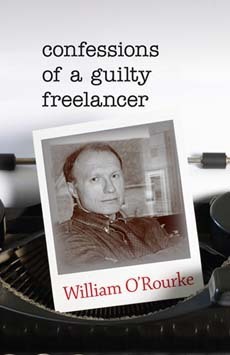
William O’Rourke’s singular view of American life over the past 40 years shines forth in these short essays on subjects personal, political, and literary, which reveal a man of keen intellect and wide-ranging interests. They embrace everything from the state of the nation after 9/11 to the author’s encounter with rap, from the masterminds of political makeovers to the rich variety of contemporary American writing. His reviews illuminate both the books themselves and the times in which we live, and his personal reflections engage even the most fearful events with a special humor and gentle pathos. Readers will find this richly rewarding volume difficult to put down.
"I can think of no other contemporary writer more suited to the task of chronicling his literary generation. A voracious reader, O'Rourke has always had his finger on the pulse of the contemporary American literary scene." —Corinne Demas, author of The Writing Circle

The Harrisburg 7 and the New Catholic Left (40th Anniversary Edition, 2012)
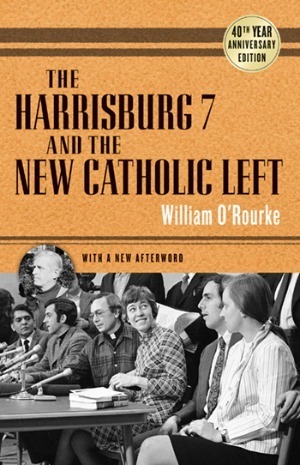
When The Harrisburg 7 and the New Catholic Left was originally published in 1972, it remained on The New York Times Book Review “New and Recommended” list for six weeks and was selected as one of the Notable Books of the Year. Now, forty years later, William O’Rourke’s book eloquently speaks to a new generation of readers interested in American history and the religious anti-war protest movements of the Vietnam era.
O’Rourke brings to life the seven anti-war activists, who were vigorously prosecuted for alleged criminal plots, filling in the drama of the case, the trial, the events, the demonstrations, the panels, and the people. O’Rourke includes a new afterword that presents a sketch of the evolution of protest groups from the 1960s and 1970s, including the history of the New Catholic Left for the past four decades, claiming that “[a]fter the Harrisburg trial, the New Catholic Left became the New Catholic Right.”
“In Harrisburg, during the trial, novelist William O’Rourke seemed to be everywhere. . . . It was a teeming, sleazy world, and O’Rourke’s book captures it. . . . It is a poet’s book. . . . This is not only the best volume on any of the recent political trials, but also a clinical X ray of our society’s condition.”
-- Garry Wills, The New York Times Book Review

University of Notre Dame Press
The Notre Dame Review: The First Ten Years (2009)
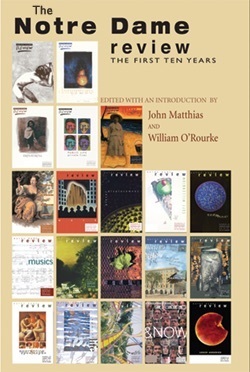
Since its founding in 1995, Notre Dame Review has become one of America’s leading literary magazines. Dana Gioia, chairman of the National Endowment for the Arts, has written, “It really has become one of the most interesting journals in the country.” This anthology consists of representative poetry and fiction from its first ten years of publication. Like the magazine itself, the collection includes work by well known authors—Seamus Heaney, Paul Muldoon, and Czeslaw Milosz among the poets; Marilyn Krysl, Arturo Vivante, Frances Sherwood, R. D. Skillings, and Richard Elman, among the fiction writers—while also making room for exciting work by new and emerging writers, some of whom are former Notre DameMFA students. The anthology also includes poetry and prose by several winners of the Ernest Sandeen Prize in Poetry and the Richard Sullivan Prize in Short Fiction, works that have set standards of excellence for writers and readers around the country.
Contributors to this anthology represent a wide range of styles and aesthetic orientations. The reader will find in this collection poems and stories that challenge, surprise, comfort, discomfort, and delight—each in its own unique way.

University of Notre Dame Press
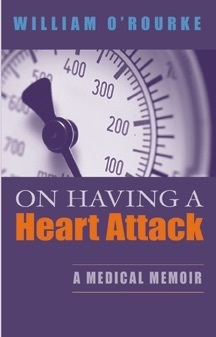
On Having a Heart Attack: A Medical Memoir (2006)
“As I walked away with my refreshments, I felt something peculiar. It was so strange it stopped me mid-step. I was forty-five years old, and I had felt many things, but never before this particular feeling: I felt a click deep inside. The image the sensation produced in my mind was of a BB, a small round piece of copper-colored lead, falling into a socket. It was a very clear image. A BB is tiny, but the one I imagined felt infinitesimal, microscopic. Yet I felt it, a click, metal on metal—like an expensive, microscopic gear had slipped, some exquisite piece of machinery falling out of alignment. Some medieval example of craftsmanship, a gyroscope, something intricate, needing fine balance. The feeling, the event, was located in my chest, below my left breast. It was thoroughly interior, as if a signal had been sent and registered, what those giant satellite dishes are poised waiting for, a transmission from deep space.” — from Chapter 1
That was October 26, 1991, in what became a singularly awful day in the life of William O’Rourke. Minutes later, at the beginning of a Notre Dame football game, he began to suffer his heart attack. O’Rourke’s account of that day, and everything that followed, is personal, informative, humorous, and highly literate. With its extended description of what an MI feels like and how people around the patient react, his memoir provides a bedside view of his experience and all of the emotions—both extraordinary and quotidian—that accompanied it.
What is startling is how that momentous event, the heart attack, divides life irretrievably into a “before” and “after.” Gone are the assumptions of what is safe and healthy; replacing them is a newly-forged relation of mind and body, a treacherous one which breeds a physical paranoia that only lessens after months. O’Rourke vividly describes the extreme pain of the attack, the forced inactivity of recuperation, and the melancholy of embracing life anew while accepting a heightened awareness of mortality. He knows his luck in having supportive family and friends, and uses his time away from normal routine to examine his family history for likely genetic proclivities for heart disease.
Through his description of his experience—from MI, to angioplasty, to cardiac catheterization to, fourteen years later, a quintuple bypass and a second round of cardio-rehabilitation—he asks us to change behaviors we can affect and pay attention to our health. It does, after all, come down to this: “Here’s to life.”
Enriched with a medical glossary and selected bibliography, this is a helpful compendium for other recuperating patients and their families, or anyone concerned about heart disease, or interested in memoir.
“Despite its somber subject, the book is as gripping as fiction, full of drama, conflict, and angst.”
– Provincetown Arts

University of Notre Dame Press
Campaign America 2000: The View from the Couch (2001)
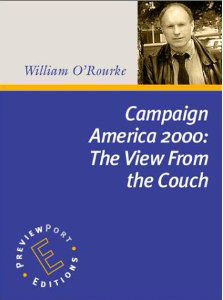
William O'Rourke's earlier book, "Campaign America '96: The View from the Couch," was greeted with wide praise. James Ledbetter wished aloud in the Washington Post that: "For the 2000 campaign, someone should give O'Rourke a national weekly column."
And that came to pass. With a new Introduction and extensive Afterword, Campaign America 2000: The View from the Couch, collects and expands O'Rourke's commentary on the longest presidential campaign in U.S. history, from speculation that Hillary Rodham Clinton might run for a senate seat to the cliffhanger election results.

Campaign America '96: The View from the Couch with new afterword (reprint, 2000)
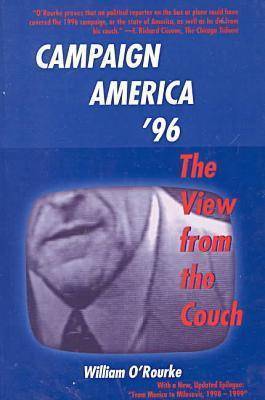
"... An engaging, nicely exasperated account of the 1996 campaign for the presidency, largely consisting of a day-by-day journal novelist O'Rourke (Notts, 1996, etc.) kept from January until election day. The twist here is that O'Rourke's journal is entirely about what he has seen on television, becoming as much a commentary on commentators as on the candidates and their spin doctors." - Kirkus Reviews

Campaign America '96: The View from the Couch (1997)
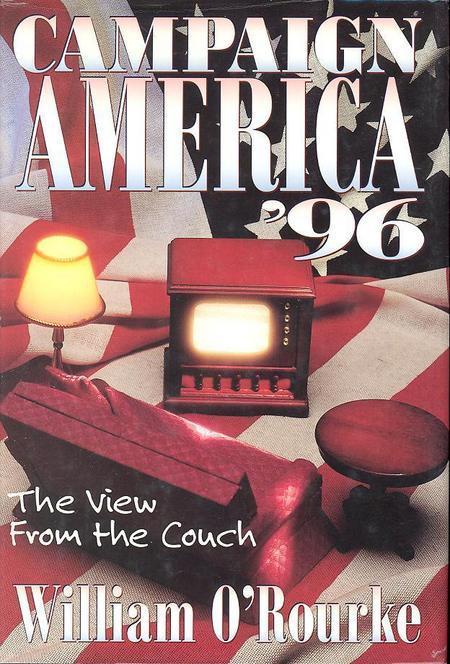
"... An engaging, nicely exasperated account of the 1996 campaign for the presidency, largely consisting of a day-by-day journal novelist O'Rourke (Notts, 1996, etc.) kept from January until election day. The twist here is that O'Rourke's journal is entirely about what he has seen on television, becoming as much a commentary on commentators as on the candidates and their spin doctors." - Kirkus Reviews

Signs of the Literary Times: Essays, Reviews, Profiles 1970-1992 (1993)
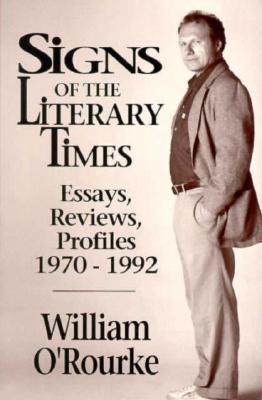
"Though unabashedly literary, O'Rourke's primary concerns--freedom, war, work, and religion--are intensely American. O'Rourke earns the respect of his readers through his superb phrasing, his rigorous thinking and his consistently sound values. As a general reader I trust what he has to tell me because his writing is so gracefully persuasive. If O'Rourke were a lawyer, I'd want him to represent me in court; if he were a carpenter, I'd want him to build my house." -- David Huddle, University of Vermont
"Signs of the Literary Times is a fascinating account of working with literature by one of America's more interesting, responsible, and innovative writers."--Jerome Klinkowitz, University of Northern Iowa.
This book is O'Rourke's first volume of nonfiction since his 1972 The Harrisburg 7 and the New Catholic Left,which Garry Wills hailed as "a clinical x-ray of our society's condition." That book prompted Herbert Mitgang to name O'Rourke "one of the finest writers of his generation." Signs of the Literary Times provides new evidence for that assessment. It brings together O'Rourke's unique mixture of literary, political, and cultural criticism published periodically during the last twenty-two years. The collection ranges from autobiographical essays describing his generation's literary evolution, to articles on free speech issues, such as nude dancing and the Bush-era NEA controversies, as well as book reviews that provide a fresh and largely uncharted critical map of the period. O'Rourke is not only interested in genre bending and expansion, but in persevering during this age of academic specialization as, in his phrase, "a person of letters."

The Harrisburg 7 and the New Catholic Left (1972)
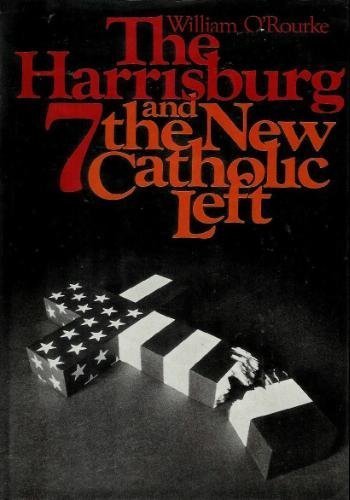
“William O’Rourke’s history of the recent Harrisburg trials is vivid, lively . . . [he] is a good and sensitive reporter, with enormous sympathy for his subject, who knows how to marshal facts and read character. His book is not so much dispassionate history . . . as it is a paean to the seven religious revolutionaries, a rueful but loving acknowledgement of their ‘brave and foolish letters,’ and a solemn threnody for the Catholic left, ‘broken by the mortar and pestle of this trial.’”
-- New Republic